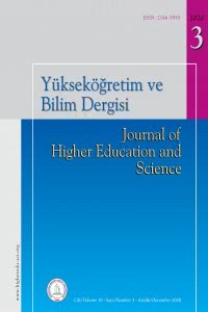Erciyes Üniversitesi Tıp Fakültesi Birinci Sınıf Öğrencilerinin Devamsızlığa İlişkin Tutumları
Bu çalışmanın amacı Erciyes Üniversitesi Tıp Fakültesi birinci sınıf öğrencilerinin devamsızlığa ilişkin görüşlerini ve tutumlarını belirlemektir. Çalışma 2015 Mayıs ayında yapılmış tanımlayıcı, kesitsel bir araştırmadır. 310 öğrencinin %81’ine ulaşılmıştır. Araştırmada öğrencilere devamsızlık tutum ölçeğini içeren bir anket uygulanmıştır. Verilerin analizinde Ki kare ve Mann Whitney U testleri kullanılmıştır. Öğrencilerin %7.2’si teorik derslere her zaman devam ettiğini söylerken, %71.1’i bazen, %21.7’si çoğunlukla/her zaman devamsızlık yaptığını söylemektedir. %81.1’i pratik derslere her zaman devam etmektedir. Yabancı uyruklu öğrencilerin teorik derslere daha çok devam ettikleri saptanmıştır. Öğrencilerin devamsızlığı önlemek için en çok belirttikleri öneri, temel derslerin ileride kullanılacak klinik bilgiler ile bağdaştırılması olmuştur. Öğrencilerin devamsızlık tutum ölçeğinden aldıkları puan ortalaması 54.6 ± 15.0; gereklilik, sorumluluk ve zorunluluk alt ölçek puan ortalamaları sırasıyla 19.6 ± 5.5, 21.4 ± 6.7 ve 13.6 ± 6.1’dir. Öğrencilerin %73.5‘i tıp fakültesinde devam durumunun kontrol edilmemesi gerektiğini söylemiştir. Araştırma sonucunda tıp öğrencilerinin devama ilişkin tutumlarının olumsuz olduğu, öğrencilerin motivasyonlarını arttırıcı ve devamsızlığı önleyici uygulamalar planlanması gerektiği sonucuna varılmıştır
Anahtar Kelimeler:
Devamsızlık, Tıp fakültesi, Öğrenci, Tutum
The Attitudes of Freshman Students in Erciyes University Faculty of Medicine towards Absenteeism
The aim of this study was to determine the opinions and attitudes of the freshman students in Erciyes University Faculty of Medicine towards absenteeism. It was a descriptive and cross sectional study, which was conducted in May 2015. 81% of 310 students were accessed. A questionnaire including an absenteeism attitude scale was applied to the students. For the analysis of data, Chi square and Mann Whitney U tests were used. 7.2% of students said that they always attended the theoretical lessons whereas 71.1% of them reported that they sometimes did not attend these lessons. 21.7%, on the other hand, stated that they mostly did not attend these lessons. 81.1% of the students indicated that they always attended the practical lessons. Another finding was that foreign students attended the theoretical lessons more than Turkish students. The most common suggestion made by the students for preventing absenteeism was linking the basic courses with clinical information to be used later. The mean score obtained from the absenteeism attitude scale was 54.6 ± 15.0. The mean scores obtained from necessity, responsibility and obligation subscales were 19.6 ± 5.5, 21.4 ± 6.7, and 13.6 ± 6.1, respectively. 73.5% of the students indicated that attendance should not be controlled in the Faculty of Medicine. At the end of the study it was revealed that medical students had negative attitudes towards attendance and there was a need to organize activities that would increase their motivation and prevent absenteeism
Keywords:
Absenteeism, Faculty of medicine, Student, Attitude,
___
- AbuRuz M.E. (2015). Doed excessive absence from class lead to lower levels of academic achievement? European Scientific Journal, 11(7), 146-153. Retriewed from http://eujournal.org/ index.php/esj/article/viewFile/5312/5121
- Usta G.H., Şimşek A.S., & Uğurlu C.T. (2014). Üniversite öğrencilerinde devamsızlık davranışları: Nedenler ve tutum düzeyleri. Yükseköğretim ve Bilim Dergisi, 4(3), 182-190.
- Wadesango N., & Machingambi S. (2011). Causes and structural effects of student absenteeism: a case study of three South African Universities. Journal of Social Science, 26(2), 89–97.
- Westrick S.C., Helms K.L., McDonough S.K., & Breland M.L. (2009). Factors influencing pharmacy students’ attendance decisions in large lectures. American Journal of Pharmaceutical Education, 73(5), 1-9 Retriewed from http://search.proquest. com/docview/211270191/fulltextPDF/156E8A6C51784DB8P Q/1?accountid=17396
- Saban A. (2002). Öğrenme öğretme süreci, Ankara: Anı Yayıncılık.
- Stanca L. (2006). The effects of attendance on academic performance: panel data evidence for introductory microeconomics. The Journal of Economic Education, 37(3), 251-266.
- Usta G.H., Şimşek A.S., & Uğurlu C.T. (2014). Üniversite öğrencilerinde devamsızlık davranışları: Nedenler ve tutum düzeyleri. Yükseköğretim ve Bilim Dergisi, 4(3), 182-190.
- Wadesango N., & Machingambi S. (2011). Causes and structural effects of student absenteeism: a case study of three South African Universities. Journal of Social Science, 26(2), 89–97.
- Westrick S.C., Helms K.L., McDonough S.K., & Breland M.L. (2009). Factors influencing pharmacy students’ attendance decisions in large lectures. American Journal of Pharmaceutical Education, 73(5), 1-9 Retriewed from http://search.proquest. com/docview/211270191/fulltextPDF/156E8A6C51784DB8P Q/1?accountid=17396
- ISSN: 2146-5959
- Yayın Aralığı: Yılda 3 Sayı
- Başlangıç: 2011
- Yayıncı: Bülent Ecevit Üniversitesi (Önceden Zonguldak Karaelmas Üniversitesi)
Sayıdaki Diğer Makaleler
Öğrenci Görüşlerine Göre Öğretim Elemanlarının Pedagojik Yeterlikleri
HACI BAYRAM YILMAZ, Ayşe KAZANCI TINMAZ
Akademide Etik İlkeler ve İhlaller: Nitel Bir Araştırma
DİLEK BAŞERER, ZEYNEP BAŞERER, AYSEL TÜFEKCİ AKCAN
Türkiye'de Yükseköğretim Kurumlarında İş Sağlığı ve Güvenliği Eğitiminde Güncel Durum
Erciyes Üniversitesi Tıp Fakültesi Birinci Sınıf Öğrencilerinin Devamsızlığa İlişkin Tutumları
ZEYNEP BAYKAN, Mehmet KILINÇ, MELİS NAÇAR
Türkiye'deki Üniversitelerin Kendilerini Konumlandırdıkları Eğitim Alanları
Kahraman ÇATI, YUSUF BİLGİN, ÖNDER KETHÜDA
21. Yüzyılda Uzaktan Öğretimde Paradigma Değişimi
Türkiye'de Harita/Geomatik Mühendisliğinde Yapılan Doktora Tezlerinin İçerik Analizi
